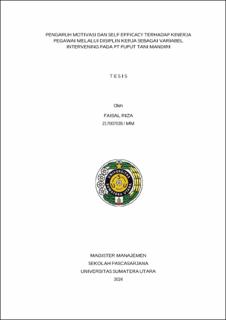| dc.contributor.advisor | Sinulingga, Sukaria | |
| dc.contributor.advisor | Sugiharto | |
| dc.contributor.author | Riza, Faisal | |
| dc.date.accessioned | 2025-02-21T08:06:47Z | |
| dc.date.available | 2025-02-21T08:06:47Z | |
| dc.date.issued | 2024 | |
| dc.identifier.uri | https://repositori.usu.ac.id/handle/123456789/101584 | |
| dc.description.abstract | Human resources should be competent and have high enthusiasm and discipline in carrying out their roles and duties well in accordance with their field. To get ideal employee and have continuously improving performance, companies should create good working conditions. The problems of this research are (1) does motivation affect work discipline? (2) does self-efficacy affect work discipline? (3) does motivation affect employee performance? (4) does self-efficacy affect employee performance? (5) does work discipline affect employee performance? (6) does motivation affect employee performance through work discipline? (7) does self-efficacy affect employee performance through work discipline?
The type of research is associative research with a quantitative approach. The population in this study were all employees of PT. Puput Tani Mandiri. They are 80 people. The entire population will be used as a sample, so the sample in this study is 80 respondents. Data processing was conducted by using Structure Equation Modeling (SEM) with Partial Least Square (PLS) 3.0.
The research results show that (1) Motivation has a positive and significant effect on work discipline. If motivation increases, work discipline will increase significantly; (2) Self-efficacy also has a positive and significant effect on work discipline. The higher the self-efficacy, the higher the work discipline; (3) Motivation has a positive and significant effect on employee's performance. The higher the motivation, the higher the employee's performance; (4) Self-efficacy also has a positive and significant effect on employee's performance. The higher the self-efficacy, the higher the employee's performance; (5) Work discipline has a positive but insignificant effect on employee's performance. It means that even though work discipline is improved, employees' performance will not increase significantly: (6) Motivation has a positive but insignificant effect on employee's performance through work discipline. It means that motivation can have a direct effect on employee's performance without work discipline as an intervening variable; (7) Self efficacy has a positive but insignificant effect on employee's performance through work discipline. It means that self-efficacy can have a direct influence on employee's performance without work discipline as an intervening variable. | en_US |
| dc.language.iso | id | en_US |
| dc.publisher | Universitas Sumatera Utara | en_US |
| dc.subject | Work Discipline | en_US |
| dc.subject | Employee's Performance | en_US |
| dc.subject | Motivation | en_US |
| dc.subject | Self Efficacy | en_US |
| dc.title | Pengaruh Motivasi dan Self Efficacy terhadap Kinerja Pegawai melalui Disiplin Kerja sebagai Variabel Intervening pada PT Puput Tani Mandiri | en_US |
| dc.title.alternative | The Effect of Motivation and Self Efficacy on Employee Performance Through Work Discipline as Intervening Variables in PT. Puput Tani Mandiri | en_US |
| dc.type | Thesis | en_US |
| dc.identifier.nim | NIM217007035 | |
| dc.identifier.nidn | NIDN8800140017 | |
| dc.identifier.nidn | NIDN0020035405 | |
| dc.identifier.kodeprodi | KODEPRODI61102#Magister Manajemen | |
| dc.description.pages | 148 Pages | en_US |
| dc.description.type | Tesis Magister | en_US |
| dc.subject.sdgs | SDGs 8. Decent Work And Economic Growth | en_US |


